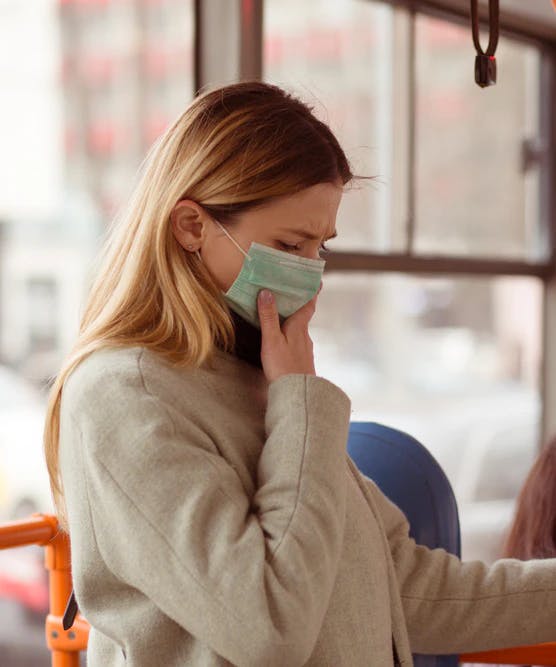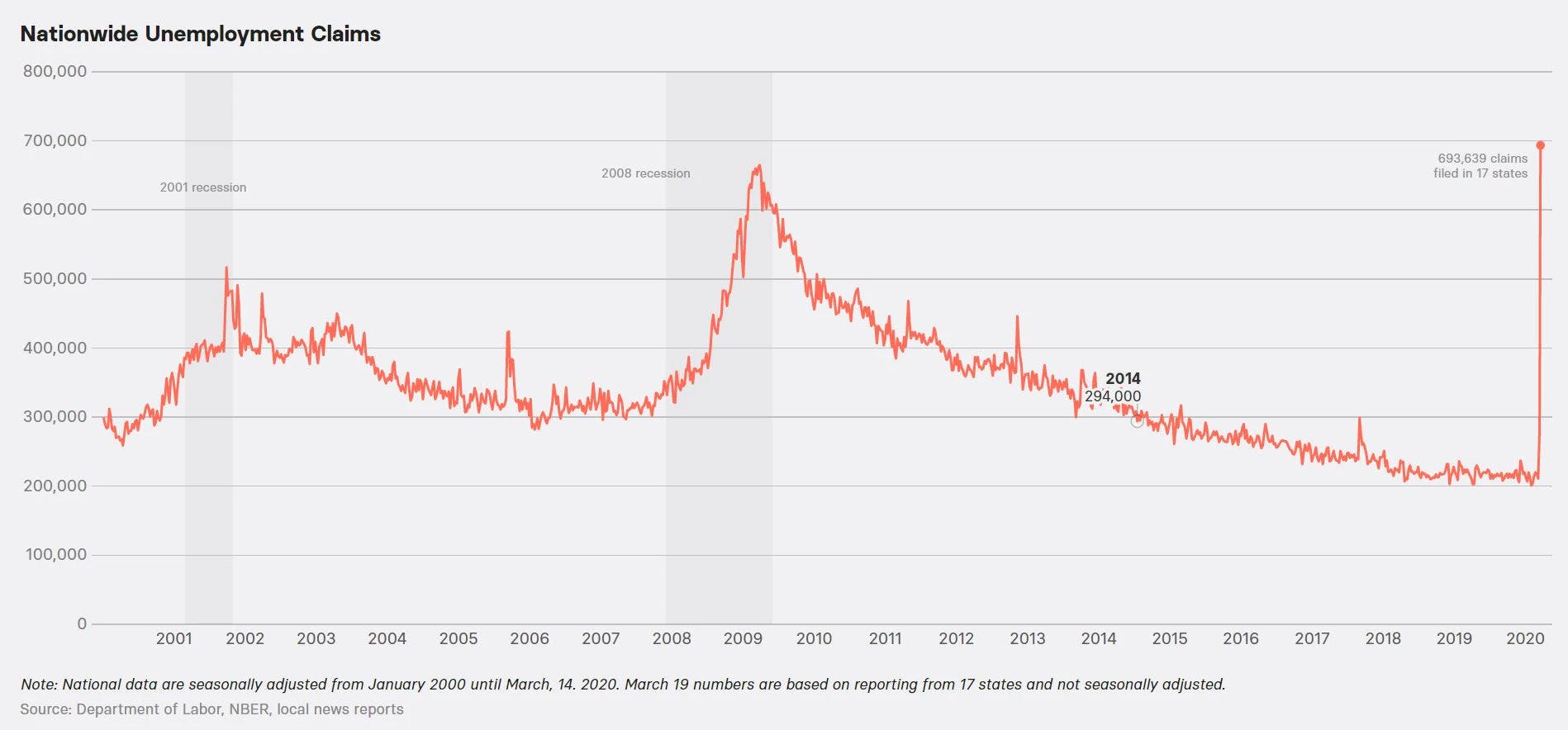The Coronavirus Quarantine Will Destroy The Economy And Many More Lives Than The Disease Itself
On January 31, the President declared a public health emergency, requiring the quarantine of anyone traveling from certain regions of China. Over the next month, it became clear that these measures had not been sufficient to prevent the spread of the virus to the US.

Next came more stringent travel restrictions, including the cancellation of all travel to and from Europe as the virus spread rapidly through the EU. Then, on March 20, California became the first state to take a radical step against the spread: requiring all non-essential businesses to close and limiting travel for citizens to only certain activities.
California was soon followed by eleven other states including New York and Illinois. At first you might think, “How courageous of these governors to take decisive action against this dangerous disease! Think of all the lives they’ll save!”
Think again.
About 1 in 3 Americans are now effectively forbidden from leaving their homes except for certain government-sanctioned activities (so far). We’ll ignore the clear violation of constitutional rights for now and simply discuss what the consequences of these “decisive actions” will be. Are these governors going to be remembered as heroes who saved the country from a deadly contagion, or— more likely — as foolhardy buffoons who plunged the nation into an avoidable depression and ruined millions of lives over a desire to appear that they had taken action in a time of crisis?
It Started with the Stock Market
Starting in the middle of February, the stock market began to plunge. The Dow Jones Industrial Average, the S&P 500, and the Nasdaq have all declined nearly 30%, making this the fastest onset of a bear market in history. The Federal Reserve has tried and failed to offset the disaster, leading some experts to call for suspending trading completely until after the crisis has passed.
We already know how destructive a stock market crash can be. We just experienced the largest recession since the Great Depression, and the stock market had finally started to recover, with the lowest unemployment numbers in 50 years and record stock highs. But now, we seem to have lost a decade’s worth of gains in less than a month. For most young people who do not have a lot of money invested in the stock market, the crash may not seem like such a calamity. But the effects of a truly devastating crash will touch the lives of every American, whether or not they are an investor.
But what happens when the market shrinks 30%? That can mean millions of retirees who lose thousands, if not millions of dollars, from their retirement income.
The most immediate effects will be felt by older Americans who are nearing or are of retirement age. Most retirees have a 401(k) or other pension plan that has been grown by investing in the stock market over many decades. But what happens when the market shrinks 30%? That can mean millions of retirees who lose thousands, if not millions of dollars, from their retirement income. We can all be focused on the danger of exposing our elders to a virus that seems to target the old and infirm, but what life are we leaving for them if they survive the virus only to be left destitute after their stock investments are wiped out? Social Security has never had sufficient funds to cover a comfortable retirement for an average American — in fact, the benefits are so little that any financial investor worth their salt will advise you to act as if you won’t receive them when planning your retirement.
We cannot sacrifice the long-term well being of an entire generation just to keep a short term crisis at bay. They may survive the virus, but living out the rest of their life in poverty, off the pennies handed out by Social Security, may be a fate worse than any virus can threaten.
Catastrophic Unemployment
What about the emotional strain of losing one’s job, or savings, or home? As of March 19, the Bureau of Labor estimated that about 700,000 Americans may have already been laid off from their jobs. There’s no evidence that the trend is slowing, which means that millions of Americans could soon have no job to return to once the quarantines are over.

Americans can’t count on the state to “have their backs.” It can take months for the government to approve unemployment benefit applications, and more than 2/3 of Americans are living paycheck to paycheck. They don’t have the recommended three months of expenses saved up to tide them over until they can start receiving benefits. Some states have tried to offset this by forbidding landlords from evicting tenants who can’t pay rent, and by keeping customers connected to utilities even when they can’t pay. But those are not sustainable solutions, even for a handful of months. Landlords need income too, and infrastructure costs money, whether we like it or not.
Even if people do have savings, they’re now being forced to drain their funds to cover an emergency they didn’t create. Instead of being able to pay off students loans, or put a down payment on a house, they’re paying for the government’s quarantine out of their own hard-won earnings. If we enter a depression, who knows how long they could remain unemployed?
It Can Destroy Our Mental Health Too
The Fed estimates that up to 30% of Americans could find themselves unemployed in the 2nd quarter of the year. That’s obviously devastating for financial reasons, but it can be devastating for our mental health as well.
First, you have the short term effects on depression of being stuck inside during the quarantine. As someone who has struggled with depression, I can guarantee that the worst place to be during a difficult time is stuck in your house, with no outlets and little contact with other people. Add that onto the crippling fear of losing one’s job, and possibly home or other assets. Tragically, researchers believe that up to 10,000 suicides between 2008 and 2010 can be linked to the economic recession in Canada, the US, and Europe. Are we willing to sacrifice another 10,000 people to suicide over fear, doubt, and isolation?
Researchers believe that up to 10,000 suicides between 2008 and 2010 can be linked to the economic recession in Canada, the US, and Europe.
Depression may not always lead to suicide, but it can also lead people to self-destructive behavior. No wonder we see the highest amount of substance abuse in America in regions with the highest unemployment. We are already experiencing a devastating opioid crisis in America, which may worsen as more people find themselves unemployed and suffering from the mental instability associated with long-term fear and stress.
Domestic Abuse and Financial Instability
Another, and equally tragic, consequence of unemployment and substance abuse is often domestic abuse. During the quarantine, thousands of victims may be trapped inside with abusers, whose anger is exacerbated by unemployment or increased substance abuse to cope with the situation.
The nonprofit Violence Policy Center estimates that an average of 1,000 women a year are killed by intimate partners, usually as a result of domestic violence. Children living in those households are also at risk of both physical abuse and the emotional trauma of living around so much violence. Given that economic downturns can increase the incidence of domestic violence, we should include the women and children who could become victims when considering the far-reaching consequences of a market crash.
Is the Cure Worse Than the Disease?
Worst case estimates from the CDC put the possible US death toll for coronavirus between 200,000 and 1.7 million people. It’s important to remember when looking at those numbers that they are higher than even the current number of all infected people (sick and recovered) over the entire planet right now. Those numbers are also based on no quarantine or preventative measures. So the likely casualty rate will be much, much lower. But even these two weeks of stagnated economic activity have seen catastrophic effects on many more citizens than could possibly be killed by the virus.
The consequences of the economic downturn created by these mandatory quarantines are guaranteed to affect every single American living today.
Yes, it’s important to reduce the spread of the virus and keep away from vulnerable groups like the elderly or the immuno-compromised to protect them from the illness. But what about the rest of us? It’s hard to estimate what percentage of the population could become infected, and out of that how many might need to be hospitalized, and then an even smaller number could become fatal cases. But the consequences of the economic downturn created by these mandatory quarantines are guaranteed to affect every single American living today.
Elderly people who survive the virus may live only to see their retirement savings lost. They’ll die in poverty. Younger families, who are trying to pay down student loans or save for a house, may be financially crippled for years by unemployment or low wages. Small business owners could lose companies they’ve spent their whole lives to build. Sure, the big corporations may get a bailout and survive the crisis as they have in the past. But dozens of large companies cannot provide enough employment for the millions of American workers out there. We need small businesses to keep our economy afloat. We need Americans with savings, with families, and with hope for the future.
Closing Thoughts
The President on Monday called for quarantines to end quickly, pushing “15 Days To Slow The Spread.” His administration knows that there is nothing the government can do to cover up a rapidly shrinking US economy. Whatever the risk of contracting the virus, it is nothing compared to the certainty of misery created by a massive recession. If it means Americans must brave the unknown, we are up to the task. But we can’t stay inside forever, waiting for a monster that may never come.